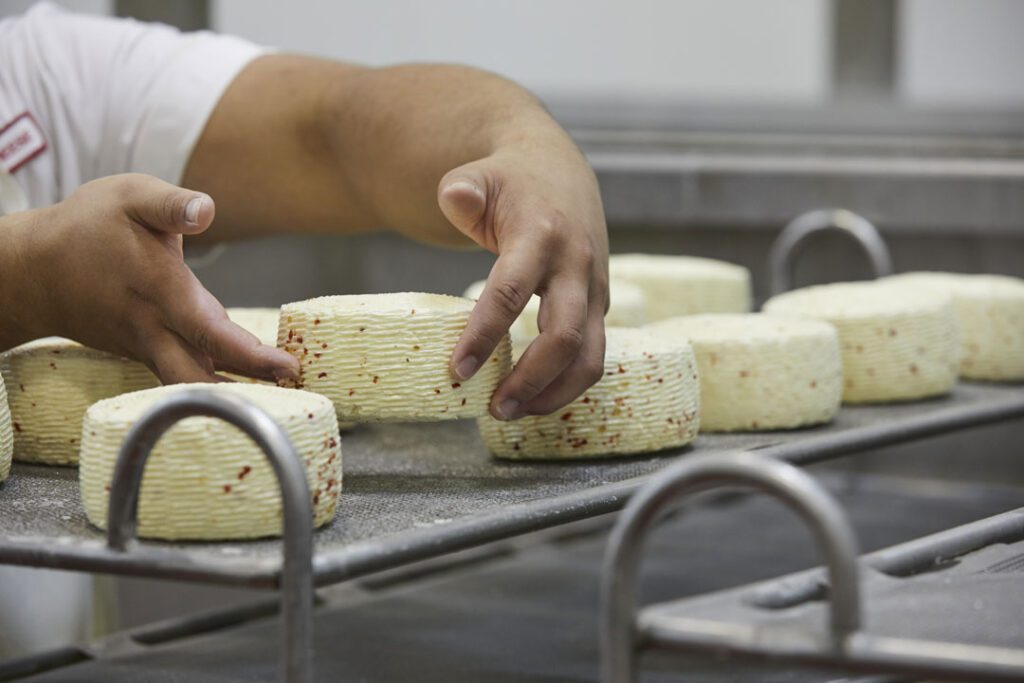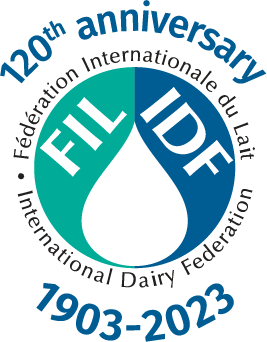Share this page
Artisanal raw milk cheese
a Brazilian experience with existing regulations and their suitability for family producers


Alignment with SDGs
AUTHOR
Michele de Medeiros Carvalho1, José Guilherme Prado Martin2, Belisa Lamas Gaudereto3, Célia Lucia de Luces Fortes Ferreira2, Juliano de Dea Lindner1
1Universidade Federal de Santa Catarina, Florianópolis, Brazil.
2Universidade Federal de Viçosa, Viçosa, Brazil.
3Universidade Estadual de Campinas, Campinas, Brazil
Abstract
In Brazil, most artisanal cheese production comes from family farms and involves the use of raw milk. Thousands of producers obtain their source of income from cheesemaking. However, there are no legal regulatory parameters specifically related to this production model. Generalized quality standards based on the industrial production model are practically inaccessible to most small producers, especially in less economically developed regions. Although some recent legislation has been altered in an attempt to better serve artisanal cheesemakers, some questions remain about its practical effects.
Despite the lack of legislation at the national level, some specific actions have had interesting results to help preserve the artisanal model of production, at the same time, guarantee the production of safe food. We present some successful experiences that resulted in the enactment of laws that specifically serve artisanal cheese producers, such as those related to the production of Colonial Cheese type, in the state of Santa Catarina, south of Brazil. This report intends to present the main challenges we faced in this process, as well as ways to strengthen the production of artisanal cheese in the country.
Introduction
Brazilian artisanal cheeses are traditionally made from raw milk and mostly produced by family farming (1). For a long time, the artisanal model was neglected in the country; cheeses were produced and sold clandestinely. In recent years, federal rules were established to include them in the supply chain; however, it was done in a disorderly manner and did not favor the family producers because it was based on existing legislation, disrespecting the traditional knowledge.
In this context, we carried out an intensive work of visits to producers of Colonial Cheese, the main artisanal cheese in the State of Santa Catarina. The project considered the cheesemakers as the central pillar of the discussion about the artisanal cheese safety. Based on the results, a proposal for a legislation was prepared, sanctioned as State Law 17486/2018 (2). This experience can serve as a model for future discussions about legislation of artisanal cheese production in Brazil.
Materials and methods
The project involved 7 properties producing Colonial Cheese type, located in Diamante, municipality of Major Gercino-SC. The main objectives were to guarantee the milk quality and the health of the herd; to build milking parlors and simple cheese dairies, respecting the rules applicable to the artisanal model as well as the socioeconomic conditions; to train the producers in GMP. Firstly, all the producers received training about the importance of controlling the entry of animals. The bovine herd was then examined for brucellosis and tuberculosis, which was repeated after 6 months to obtain certification as a property free of these zoonoses, as provided in our national program (PNCEBT) (3). Later, cheese dairies were built in each of the properties, following simplified and low-cost norms. In this, such properties are allowed to perform the ripening and packaging steps in the same production environment; they are also exempted from the requirement of specific locations for storage and warehousing, as long as they respect a production flow that avoids cross contamination, and make use of adequate locations for the storage of daily inputs2.
Once the physical construction was completed, training was given to train the producers in hygienic milking, respecting GMP. The quality of the milk and cheeses was also monitored with physical-chemical and microbiological analyses. The project was funded by the Fundação Banco do Brasil and conceived by researchers from the Federal University of Santa Catarina (UFSC) and the Agricultural Research and Rural Extension Company of Santa Catarina (EPAGRI).
Artisanal cheese production in Brazil supports livelihoods and rural development
Guillaume Tessier Tweet
Results
Regarding zoonoses, all seven properties were certified as free of brucellosis and tuberculosis, demonstrating the producers’ full compliance with the management of the dairy herd. This is, therefore, an indispensable condition for the safety of artisanal cheese. From a new scenario, with the cheese dairies built, the cheeses produced therein, applying the good agricultural, milking and production practices discussed during the producers’ training stage, a new collection of samples was taken to monitor the quality of the final product.
From the laboratory analysis, it was found that the cheese samples produced using raw milk of better quality (corresponding to 71% of the samples) met the microbiological parameters established by legislation after 15 days ripening, the average time practiced by producers in the region to market the Colonial cheese type from Diamante.
Discussion
The interventions were carried out in a way that respected the traditional knowledge of the artisanal production of Colonial Cheese type from Diamante. This is, therefore, a very important premise for the success of the actions developed in the community, since it is in line with the practice of those who actually produce the cheese. It is necessary that the proposed changes are imbued with meaning for the producer; otherwise, the risk of not meeting them would be high (4). In this context, it was proposed to maintain the traditional wooden utensils, such as presses, molds and maturation shelves.
The new cheese dairies were built with an architecture similar to the producers’ homes, according to their personal choices regarding the organization of the physical space, provided, of course, that the sanitary norms in force were respected. In this way, characteristics familiar to the producers were preserved, constituting a symbolic value and an invaluable identity for them. In each of the executed stages, the producers were recognized as an important part of the adaptation process, whose previous experiences were widely valued.
Considering that the central idea was to assist the producers in legalizing the production and commercialization of cheeses, without de-characterizing the artisan mode of production, the implementation of changes aiming at improvement could not be done in a vertical way (as reported so far by the producers assisted by the project), especially by agents of regulatory agencies averse to issues related to secular traditions inherent to the cheesemaking activity.
Conclusion
The Colonial Cheese type from Diamante, which historically was produced in the same kitchen and stove where the family meals were prepared, would have its production moved to another location. However, the possibility of coming out of clandestinity made the cheesemakers quickly identify personally with the new work space, affectionately called “cheese houses”. For a practice to be considered tradition, it is necessary that it be passed on over time and be imbued with meaning, that it makes sense to its practitioners. The production of Colonial Cheese was, in recent years, losing its meaning for the producers. The new cheese dairies provided, therefore, a wave of hope and pride in preserving this centuries-old practice.
Before the project, many producers indicated a desire to stop production and dedicate themselves to another type of economic activity. In the end, we have observed the return of the children to the community, leaving large urban centers to dedicate themselves to the cheese making activity in the rural environment. The effects were also noticeable from the recognition of the cheeses in the Prêmio Queijo Brasil, the largest national contest of Brazilian cheeses. The producers understood the importance of the work developed, especially since it became possible to price the final product more fairly and profitably. Subjectively, recognizing the real value of the cheese, for the producers, is also symbolic: it is the appreciation of the efforts of many past generations that have provided the existence, in the present, of the Colonial Cheese type from Diamante.
References
Carvalho, M.M., de Fariña, L.O., Strongin, D., Ferreira, C.L.L.F. & Lindner, J.D.D. Traditional Colonial-type cheese from the south of Brazil: A case to support the new Brazilian laws for artisanal cheese production from raw milk. J. Dairy Sci. 102(11):P9711-9720 (2019).
Estado de Santa Catarina. Lei Nº 17.486, de 16 de janeiro de 2018. Dispõe sobre a produção e comercialização de queijos artesanais de leite cru e adota outras providências. Diário Oficial do Estado, Florianopolis, SC, 16 de janeiro de 2018.
Brasil. Ministério da Agricultura, Pecuária e Abastecimento – MAPA. Instrução Normativa SDA n° 10 de 3 de março de 2017. Estabelece o Regulamento Técnico do Programa Nacional de Controle e Erradicação da Brucelose e da Tuberculose Animal – PNCEBT e a Classificação das Unidades da Federação de acordo com o grau de risco para as doenças brucelose e tuberculose, assim como a definição de procedimentos de defesa sanitária animal a serem adotados de acordo com a classificação. Diário Oficial da União, Brasília, DF, 20 de junho de 2017.
Freire, P. Extensão ou comunicação? 7ª edição. Rio de Janeiro: Paz e Terra (1983).






